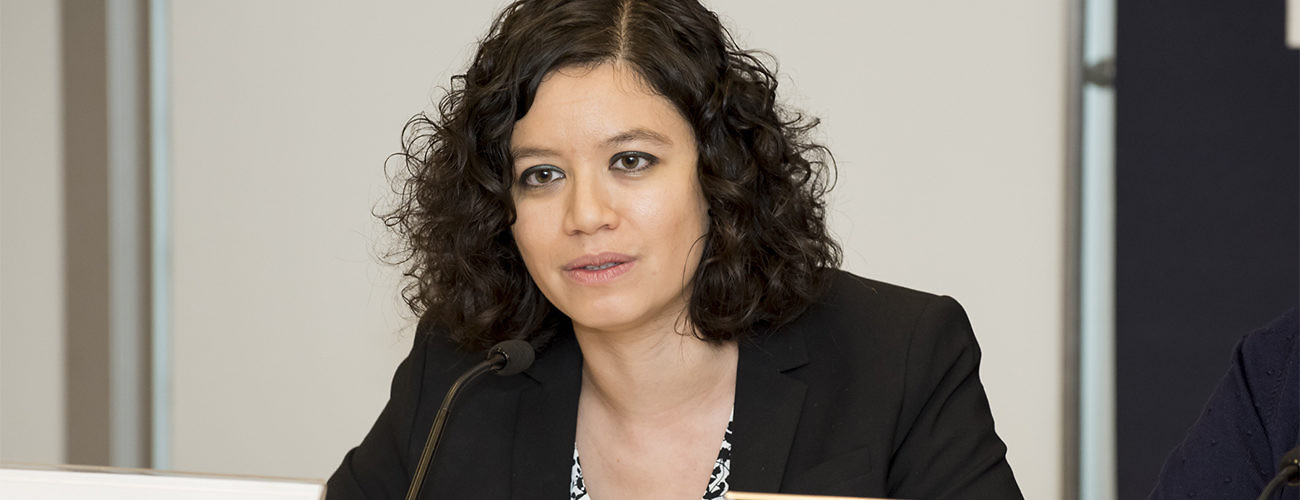On October 5th, IPI hosted a policy forum to discuss the challenges and recommendations made in the new IPI report “People Before Process: Humanizing the Human Resources System for UN Peace Operations.”
The author of the report, IPI Post-Doctoral Fellow Namie Di Razza, said her interviewing for the 54-page policy paper showed that human resources in the context of peace operations stirred particular passions among the people she talked to.
“You are talking about very unique types of jobs, you’re talking about jobs that are about dealing with human suffering in the most difficult conflict zones,” she said. She gave the example of a protection adviser who can’t hire the right person to save lives or ill-chosen staff members whose known incompetence can jeopardize an entire peace process.
“What was striking during the research and writing process,” she said, “was how much human resources at the UN is overly focused on process when it should be about people.”
She described the complexity of human resources rules and procedures, highlighting the fact that the hiring manual is almost 250 pages long and that hiring someone in the field that takes an average of 189 days. She also reviewed past reform efforts, which, despite positive effects, were not always adapted to the needs and dynamics on the ground.
She listed the four major recommendations made in her report:
- Prioritizing the selection and retention of the right people
- Reducing bureaucracy
- Empowering human resources staff in the field
- “Depoliticizing” human resources at the UN
On the last point, she said, “Member states negotiate each post in peacekeeping missions, which leads to the worst kind of micromanagement you can imagine. The UN is often considered a job fair for member states, and human resources itself is seen as an object of political bargaining for political gains.”
For each of the directions recommended, she stressed that member states and the Secretariat will need to pursue political, organizational and cultural change.
Chhaya Kapilashuman, Director of Field Personnel Division in the UN Department of Field Support, acknowledged the “complexities and challenges” the UN faced in this area and said they had prompted “a lot of soul searching on how to improve human resources at the UN.” She asserted that there was “an ambition within the Secretariat to continue to improve.”
Pointing to the size and reach of the Department of Peacekeeping Operations, she said, “You can imagine how difficult it is with the diversity that we have to find one common set of rules and regulations that work for everyone. We have to look at how to differentiate to ensure that we are meeting our objectives in human resources and also meeting the needs of our operations and the diversity of our staff.”
She said that meeting the Secretary-General’s goal for gender parity by 2030 posed problems for the Secretariat but particularly for field missions.
“We have been around 20 to 26 percent over a number of years despite the many efforts that we have tried,” she said. But she added that increasing and retaining women staff wasn’t just “a question of doing the right thing. It’s our operational necessity.”
Fabrizio Hochschild, Assistant Secretary-General for Strategic Coordination in the Executive Office of the Secretary-General, said he was “astonished” at how little external study there had been on critical human resources aspects of peace operations like the choice of staff, the timeliness of their deployment, and the motivations behind their service. The importance of devoting more attention to this could not be overstated, he said, and deserved greater scrutiny than it was getting.
“Any hiring is a lifetime commitment of the organization to an individual at a huge cost–a huge financial cost, and, when you get the decision wrong, a huge cost to the reputation of the organization, the motivation of the team, and the welfare of those the UN is meant to serve.”
Cherith Norman, Minister Counselor for UN Management and Reform at the Permanent Mission of the United States to the UN, described the challenge as attracting the right people with the right skills at the right time and place, maintaining high performance and addressing underperformance with transparency, and achieving efficiency with competitiveness, control and flexibility.
She concluded, “Getting the balance right is not impossible, but it also won’t be easy.”
The moderator of the conversation was Arthur Boutellis, Director of IPI’s Brian Urquhart Center for Peace Operations.








